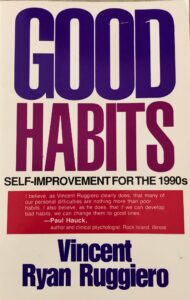 Making sense of the present age is like playing whack-a-mole. Every time we smack down one foolish notion, another pops up, then another and another. To make matters worse, more and more people seem to be accepting the foolishness rather than smacking it. We are left wondering what we can possibly do to restore sanity to our world.
Making sense of the present age is like playing whack-a-mole. Every time we smack down one foolish notion, another pops up, then another and another. To make matters worse, more and more people seem to be accepting the foolishness rather than smacking it. We are left wondering what we can possibly do to restore sanity to our world.
Neither the foolishness that surrounds us nor the wondering how to overcome it are new. Both have been growing for decades. There has always been a solution but there is no magic to it. It does not involve correcting or improving others, let alone the world. Instead, the solution is to improve ourselves and let our example spread throughout the culture.
In 1991 I wrote a book explaining this solution in detail. It was titled Good Habits: Self-Improvement for the 1990s. Sadly, in the battle of that book (and others like it) against the foolishness in the culture, the foolishness won.
Though that foolishness has become more dangerous to America than it was 33 years ago, the solution remains the same. This essay presents excerpts from the Preface to Good Habits. Subsequent essays will discuss the habits that can improve individuals and cultures.
Preface to Good Habits (1991)
“Millions of people have become disenchanted with the ME-ism that has dominated the last several decades and lingers yet today. ME-ism preaches indulging your desires, doing your own thing in your own way, asserting yourself, and ‘taking care of number one.’ It promises success, personal happiness, and freedom from neurosis. Unfortunately, the promise is empty.
“During the reign of ME-ism, we have witnessed increasing tolerance of mediocrity and scorn of craftmanship, growing disregard and even contempt for the sensibilities of others, and erosion of respect for neighbor, family, and country. Worse, we have seen the assassination of three of our leaders, the attempted assassination of several others, and a rise in the incidence of both white-collar crime and street crime.
” We are challenged by a formidable array of social problems, including drug addiction, illiteracy, rape, hate crimes, satanism, spouse abuse, and child molestation. A quarter of our teenagers drop out of school due to pregnancy or loss of interest in learning. Many are lost to drugs, alcohol, or suicide.
“At least two lessons can be drawn from these depressing realities: First, a safe and sane world is not possible without respect for the needs and rights of others; second, excellence at work and in our personal lives is never achieved by mere wishing or pretending, but only by effort. Proclaiming ourselves wonderful no more makes us so than chanting ‘We’re number one’ confers athletic success.
“This society desperately needs a different view of self-improvement from the one that has reigned since the 1960s. It needs a no-nonsense back-to-basics perspective that puts competency before self-confidence and replaces self-adulation with self-mastery. . . Good Habits reflects this view. . . It is based on two facts . . . 1) Habit is the dominant force operating in our lives . . . and 2) Bad habits can be changed.
“. . . Deep within every person is a yearning to do something meaningful with his or her life . . . Circumstances seldom afford us the chance to be an Albert Einstein, a Winston Churchill, or a Mother Teresa. Yet there is another way to fulfill our yearning, a way no less profound for being more modest. That way is to change the world within us.
The Preface ended with this poem by R. L. Sharpe that visualizes the context of habit formation.
Each is given a bag of tools,
A shapeless mass,
A book of rules;
And each must make,
Ere life is flown,
A stumbling block
Or a stepping stone.
Subsequent essays will discuss specific habits for self-improvement.
Copyright © 2024 by Vincent Ryan Ruggiero. All rights reserved.



